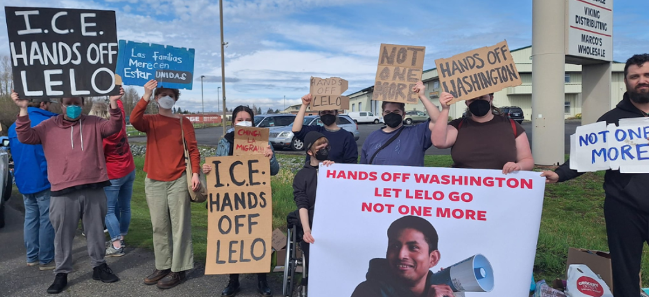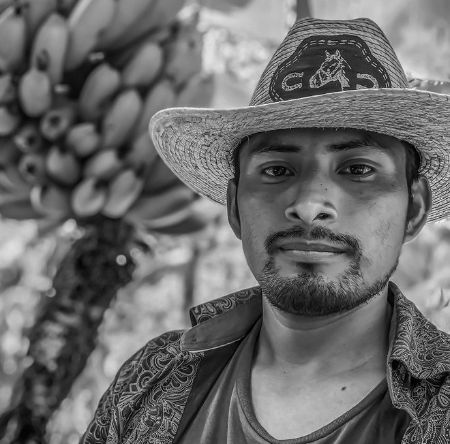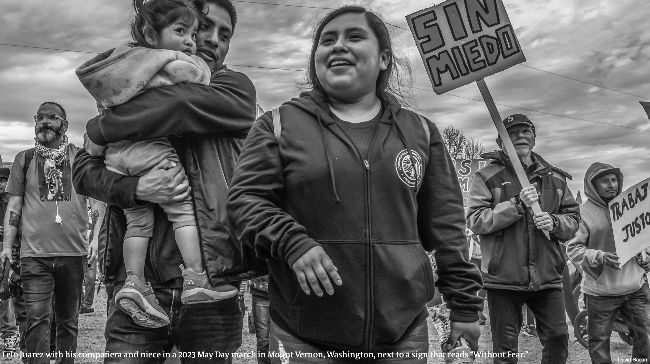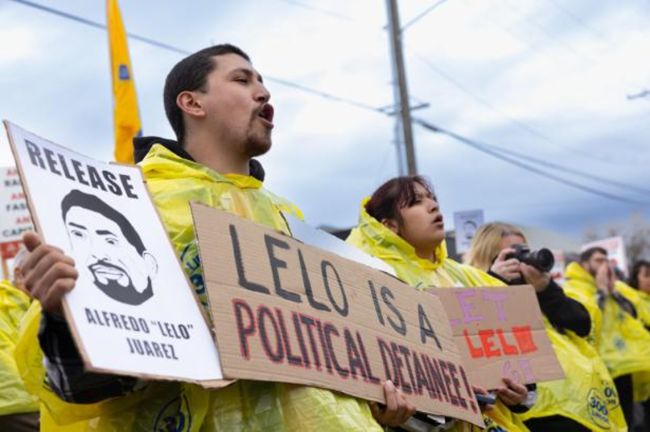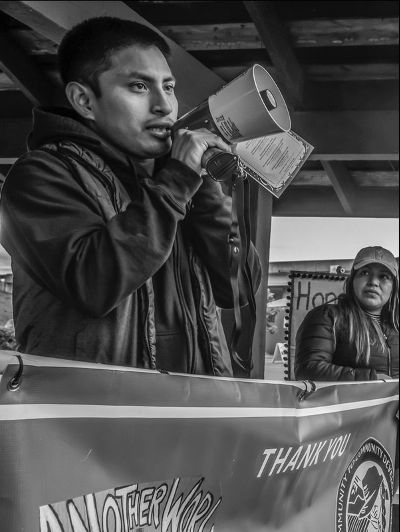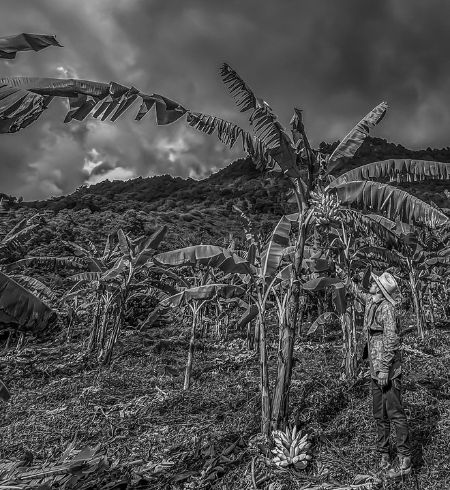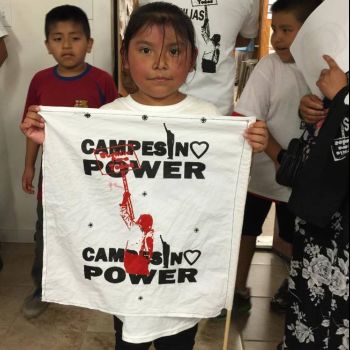|
|
The weekly newsletter of the Mexico Solidarity Project |
|
Every issue archived online at mexicosolidarityproject.org/archives/ |
|
September 03, 2025 |
|
|
|
Immigrant Options: Deportation or Deportation |
|
Meizhu Lui, for the editorial team |
|
|
Supporters at a “Hands Off” rally demanding Alfredo's release. Photo: Community to Community Development |
|
During Trump’s first presidency, throwing meat to his racist and nativist base, he attempted to ban individuals from majority Muslim countries from traveling to the US. It was the opening salvo in his campaign to make America white and Christian again.
Now he has a second chance. This time, he’s thrown open the gates of hell, releasing the largest, most lethal, most invasive police force in US history to detain and deport immigrants, ignoring their legal and human rights. His single-minded demonization of immigrants acts as a cover for his shift of government dollars from programs serving the people to those punishing the people, and in the process, lining the pockets of his wealthy friends in the private prison-industrial complex.
Caught up in this wave of arrests, migrant farmworker organizer Lelo Juarez knew that once detained, his only options were deportation — or deportation. If deported by ICE, he might end up in Uganda, the Trump administration’s stated plan for Kilmar Abrego Garcia, a man they wrongly arrested by their own admission. Lelo took the option of voluntarily returning home to Mexico.
Life in Mexico will have its rewards. His elderly parents, who left Mexico long before the 4th transformation began, will collect decent social security payments. His kids will have school scholarships and learn not about the greatness of white America but about Yankee imperialism. He will be his own boss on his farm, away from ICE’s menacing shadow.
But that is not enough. Lelo’s family and immigrants from all over the world, who provide the backbone to so much of the US economy, from home repair to the food on our table, built a life and put down roots on US soil. They’re entitled to their choice of homeland without fear of forced removal. |
|
|
Farmworker Lelo Juarez: Why Self-Deportation |
|
We published an interview by Derek Seidman with Edgar Frank about farmworker organizer Alfredo Juarez Zeferino, or “Lelo,” when he was first detained by ICE on April 16, 2025. In July, photojournalist David Bacon interviewed Lelo by phone while he was imprisoned in the Northwest Detention Center in Tacoma, Washington, two weeks before he agreed to "voluntary departure." David spoke with Lelo again when he was home in Mexico, where he could talk more freely. |
|
David Bacon: You were arrested and detained on March 25, and spent over three months in detention. What were the conditions in the Tacoma Northwest Detention Center? |
|
Lelo Juarez: It’s a really terrible place, and bad food is probably the worst problem. The Geo Group is the private corporation that runs the detention center, and it’s supposed to provide three meals a day, but often the last meal comes at one or two in the morning. The rice was hard, like it never touched hot water, and the beans were never cooked all the way. That was the main food they gave us. Chicken was so undercooked that sometimes it dripped blood, and people got sick during the night. One time everybody turned in their trays, and we wouldn’t take the food. |
|
|
Lelo Juarez in 2025 after accepting voluntary departure. Photo courtesy of Lelo Juarez |
|
The second week I had vision problems because the lights were always on at night, making it hard to sleep. I signed up for “sick call” and waited a long time to see a doctor until finally an officer sent us back to our unit — I wasn't going to be seen. They only had one doctor. Other folks in my unit waited hours and hours and still weren’t seen.
Your family left the US first, right? |
|
In early March, before I was even detained, my family decided to return to our hometown in Mexico, a hard decision because my parents had lived in Washington for 18 years. My siblings were born in the US and going to school there. All their friends are there. |
|
|
Lelo Juarez with his compañera and niece in a 2023 May Day march in Mount Vernon, Washington, next to a sign that reads “Without Fear.” Photo: David Bacon |
|
But when we saw ICE rounding up more and more folks, my family didn’t want the trauma of separation.They left on March 16 from Santa Maria on the bus. It’s hard to describe the feeling. We always had this plan for my siblings to go to school and have a better life, more opportunity than my parents had. It was like we had to start all over again.
After your family left, how did ICE find and detain you?
On March 25, I was driving my compañera to work in the tulip fields of the Washington Bulb Company, north of Seattle, when I was stopped by immigration agents. I asked them for a warrant, but they just broke the car window and dragged me out. |
|
|
March 27 protest, Tacoma ICE Detention Center: Photo: Santiago Ochoa/Cascadia Daily News |
|
Within hours I was in the Tacoma detention center and in line for a flight back to Mexico. There was a campaign to get me out, including calls from US Representative Rick Larsen, Democrat from Washington, and Washington Governor Bob Ferguson, also a Democrat, and that saved me from immediate deportation. |
|
Later, ICE said they detained me because of an earlier deportation order, but that was a pretext. Before my detention, I had no idea about the 2017 removal order from the first Trump administration. If they’d really wanted to remove me, they could have, but they didn’t. They waited until Trump was president again. They didn’t give me the opportunity to respond or fully defend myself — I never got due process.
Why do you think you were targeted? |
|
|
Lelo Juarez speaks at a 2023 May Day march of migrant farmworkers and their supporters in Mount Vernon, Washington, calling for union rights and human rights. Photo: David Bacon |
|
Because of my history as a farmworker organizer. In Washington, I cofounded a new union, Familias Unidas por la Justicia, and I helped organize campaigns by Community to Community, the state’s advocate for agricultural workers.
But mostly, the growers were hostile to me because I publicly criticized the H-2A contract labor program. Growers like WAFLA — that’s the Washington Farm Labor Association, a large labor contractor — know me well and were upset by our opposition to the H-2A program. I talked to workers who were not on H-2A visas about losing their jobs because H-2A was now the way to be legal. I also talked to the H-2A workers themselves when they called to report abuses built into the program. |
|
You spent months in detention, but in mid-July, you decided to go home. Why then?
ICE is trying all they can to get folks out of the country by deporting them or asking them to self-deport. In the Tacoma detention center, they came to my unit three times, saying that if people gave up their right to fight their case and self-deported, they’d send them $1,000 after sixty days. People got really mad because we have families here and we’ve been part of the community for many years. What’s $1,000 compared to twenty years of your life?!
But detention takes its toll, what with its dehumanizing conditions and the hopelessness of resolving our cases.
Many people I knew in detention filed cases, and they all lost and got deported. Two people even won their cases — and they’re going to be deported anyway! A lot of people here have legal status and good jobs, and they’ve been paying taxes for years. But at the end of their last hearing, they get deported anyway.
My case was no different. Winning from within just didn’t seem possible. Even if I went through all the legal steps and had a decision in my favor, there was no guarantee I’d be released. Signing the voluntary departure was the only option I had.
How did it feel to be home again in Santa Cruz Yucucani in Guerrero? |
|
I remembered it from childhood. I went to town a couple of days ago, and people recognized and invited me to eat. I’ve had a lot of really good food here. Other families have come back here as well, and folks are excited that we’re back.
When I returned, I began going out to the family farm with my father and grandfather. They plant corn, green beans, pumpkins and bananas. My grandpa sells a little bit of it, but it’s mostly just for the family.
|
|
|
Lelo Juarez harvesting bunches of bananas on his family's farm in Santa Cruz Yucuyachi, Guerrero, Mexico, 2025. Photo courtesy of Lelo Juarez |
|
How does this work compare with your US work as a union organizer of farmworkers who work for wages in industrial agriculture? |
|
|
Campesina: photo courtesy of Familias por la Justicia |
|
The big difference is that here we don’t work for anybody, because the fields belong to the family. We can take a break whenever we want, and when it gets hot, we just go find shade. It’s a huge change from being a farmworker working for a boss.
But I don’t forget the union and the community they took me from by force. I haven’t stopped feeling part of an immigrant community that’s trying to defend itself. As a farmworker, it’s heartbreaking to see pictures of the military chasing us in the fields. |
|
We’ve never been able to legalize, and now we have to leave. It’s not right. People have to pay attention to what's happening and speak up. Don’t look the other way.
But meanwhile, I have to live. Tomorrow I’m going to the banana field — the first time in eighteen years. |
|
|
|
|
The Right's Normalizing of Political Violence |
|
|
Mexico City-based freelance journalist José Luis Granados Ceja writes for Venezuelanalysis. He co-hosts the Mexico Solidarity Project's English language weekly podcast Soberanía, and the Spanish language TV program on Canal Once, Sin Muros. |
|
|
Right-wing forces across the globe have crossed a line. We are witnessing the emergence of a consensus that not only tolerates violence but fully embraces it, a fascist ideology centered on physical threats or even homicidal intent to all who oppose them.
Over the last few weeks, we have witnessed the assassination of Yemeni Prime Minister Ahmed al-Rahawi, the US deployment of Navy ships off the coast of Venezuela and daily examples of Zionist genocidal actions in Palestine. The rationalization and normalization of Zionist violence by both liberals and conservatives alike have played a huge role in the development of this new violent consensus.
The normalization of political violence by not only fanatical far-right forces but also the so-called “moderate” opposition is a terrifying development. In the same week that saw US military maneuvers in the Caribbean aimed at intimidating Venezuelan President Nicolás Maduro, we saw Mexican Senator Lilly Téllez openly call for US military intervention inside Mexico. Whether it be Venezuela or Mexico, US unilateral military action will result in civilian bloodshed. This point cannot be emphasized enough. Be it María Corina Machado in Venezuela or Téllez in Mexico, their calls for “help” from the US military mean only one thing: the killing of innocent people.
Téllez’s treasonous statements are treated as if they form part of a rational discussion. Corporate media outlets bear much responsibility for normalizing this new consensus. As journalist Adam Johnson pointed out, it is offensive that an outlet like Axios should grant anonymity to US government officials talking openly and casually about assassinating the Venezuelan president.
Last Wednesday, Mexican PRI opposition leader Alejandro “Alito” Moreno physically attacked Senate President Gerardo Fernández Noroña, and various outlets and journalists, most notably Ciro Gómez Leyva, went into overdrive to justify the aggression.
But the video evidence is there for all to see. Moreno and five other PRI lawmakers surround Noroña, and when Noroña attempts to shake off Moreno's grip on his arm, Moreno begins striking him. Noroña’s fellow Morena lawmaker Dolores Padierna tries to escort him away, but PRI lawmaker Carlos Gutiérrez Mancilla grabs his coat and again attempts to strike him. Afterwards, Alito and his gang showed no remorse, instead doubling down and threatening further violence.
Noroña is absolutely correct to call out the media's naked attempt to recast the aggressor as the victim, a page out of the fascist playbook. Porrísmo (a Mexican term for organized, violent groups who intimidate or harass political opponents) has a long history, and it’s time to draw the line.
Politicians like Téllez have alleged that President Claudia Sheinbaum’s government has ties to organized crime. Will it be long before they call for the US to “take out” the president? We must put a firm stop to the Mexican right’s continuing use of political violence; this slippery slope can lead to tragedy.
US imperialism itself is moving into a more dangerous phase. Writing about the Twelve-Day War against Iran, Ali Terrenoire speculates that the war’s goal was not regime change. Terrenoire writes that instead it was “de-development…the West no longer needs to ‘win over’ hegemonic states — but can simply destroy their state capacity (or the state in its entirety).”
We can make the case that this is also the deadly logic at play in Venezuela. Continuing to normalize violence in Mexico could very well lead us to the same place. |
|
|
|
Recent news reports and commentaries, from progressive and mainstream media, |
|
Tallis Boerne Marcus, How Mexico lifted 13.4 million out of poverty in six years People’s Dispatch. Rather than poverty reduction stemming from economic growth, it has been achieved through a redistribution of resources.
Rolando Cordera Campos, Por el bien de todos: crecer y redistribuir La Jornada. México necesita emprender un nuevo curso de desarrollo, entendido como una combinación de crecimiento económico con redistribución social. Para ello, urge revisar y fortalecer el papel del Estado.
Jack Nicas, Mexico’s President Struggles to Escape Trump’s Growing Demands New York Times. After months of negotiation and concessions, President Claudia Sheinbaum of Mexico has found herself in a cycle of pressure from the White House.
César Verduga Vélez, Igual que en Venezuela: la derecha en México pide la intervención militar de EE UU con la excusa del narco Tiempo Argentino. La senadora del PAN (Partido de acción Nacional) Lilly Téllez lo hizo en una declaración a la televisora Fox News. Fuertes críticas y pedidos de juicio por traición a la patria..
The DEA and the Sheinbaum administration: A new era or an imminent clash? Telesur English. The question is whether Sheinbaum will maintain the critical distance that characterized her predecessor, AMLO, or if she will seek closer cooperation with an agency that has historically generated friction and questions about respect for Mexican sovereignty.
Eduardo Nava Hernández, Dependencia recrudecida Rebelión. La capacidad de resistencia frente a los designios y presiones estadounidenses parde haberse reducido a cero.
Verónica M. Garrido, Tense debate in the Mexican Senate: ‘He hit me and said, ‘I’m going to kill you’’ El País. A lawmaker for PRI assaulted the chamber leader and a cameraman after he was denied a chance to speak in a session where members of the ruling party were described as ‘Morenarcos’.
México rechaza propuesta de Ted Cruz para que EU combata a los cárteles en territorio nacional La Jornada. La Secretaría de Relaciones Exteriores (SRE) respondió que, de acuerdo con nuestra Constitución, las funciones en materia de seguridad dentro del territorio nacional “corresponden exclusivamente a las autoridades mexicanas”.
Devin B. Martinez, PRI leader throws punches in Mexican Congress as opposition clamors for US military presence People’s Dispatch. The congressional brawl highlights the deepening crisis of the opposition as Mexico’s political landscape shifts.
Noroña llama “cretino” a Rutilio Escandón por defender condiciones de Alligator Alcatraz; condena actitud “servil” ante EU El Universal. El senador aseguró que dichos penales violan derechos humanos y lastiman la dignidad de los migrantes. |
|
|
|
|
The Mexico Solidarity Project brings together activists from various socialist and left organizations and individuals committed to worker and global justice. We see the 2018 election of Andrés Manuel López Obrador as president of Mexico as a watershed moment. AMLO and his progressive Morena party aim to end generations of corruption, impoverishment, and subservience to US interests. Our Project supports not just Morena, but all Mexicans struggling for basic rights, and opposes US efforts to undermine organizing and Mexico’s national sovereignty.
Editorial committee: Meizhu Lui, Bruce Hobson, Agatha Hinman, Victoria Hamlin, Courtney Childs, Pedro Gellert. To give feedback or get involved yourself, please email us! |
|
Subscribe! Get the Mexico Solidarity Bulletin in your email box every week. |
|
Web page and application support for the Mexico Solidarity Project from NOVA Web Development, a democratically run, worker-owned and operated cooperative focused on developing free software tools for progressive organizations. |

